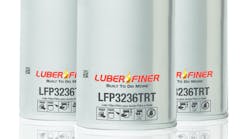Soot is present in every year, make and model of heavy duty engine, points out John Gaither, director of heavy duty engineering for Fram Filtration. Modern engines equipped with exhaust gas recirculation (EGR) and selective catalytic reduction (SCR) technologies generate higher levels of soot, along with organic and inorganic acids.
Formed in 2012 with the merger of Fram and Champion Laboratories, Fram Filtration (www.Fram-Filtration.com) offers heavy duty filters under the Luber-finer and Fram Heavy Duty brands.
"Soot is carbon, actually unburned carbon, and a by-product of the combustion process," he says. "That's what makes oil black."
A CRITICAL CHARACTERISTIC
Gaither says that when you cannot get used diesel oil off your hands, it is because the soot is so small it is within the pores of your skin. That is why soot is especially difficult to remove from the oil.
Soot particulates are measured in microns, which is the critical characteristic it comes to filter technology.
While red blood cells are 7 to 8 microns, and white blood cells are 25 microns, combustion-size soot is sub-micron (0.01 microns), says Gaither. By comparison, a human virus may be less than 1 micron - the same size as soot.
MORE SOOT PRODUCTION
The J.D Power and Associates 2012 Heavy Duty Truck Engine And Transmission Study stated that technology changes related to revised emissions standards for heavy duty trucks are causing an increase in heavy duty truck engine problems.
"Oil is working much harder," says Brent Birch, principal engineer with Fram Filtration. "Systems are using urea with selective catalytic reduction to reduce NOx emissions.
"More soot is being generated because of the programming configurations electronic control modules must employ to optimize combustion, power and fuel economy," he explains. "When engine output is optimized and emissions minimized, you end up with more particulate matter, which we call soot."
The same technologies that allow fleet managers and their modern heavy duty engines to comply with emission standards can create new challenges by producing and retaining more soot in the oil than ever before, continues Birch. Over time, these small details can have a huge impact on an engine, and a fleet's bottom line.
RECOMMENDATIONS
Because of new engine characteristics and extended drain intervals, Gaither recommends fleets run premium oil (synthetic is preferred) and premium filters, such as the Luber-finer Imperial XL or Time Release Technology (TRT) filters.
"It is almost impossible to mechanically filter soot at high removal efficiencies," observes Birch. "A good oil will keep soot in suspension so it does not agglomerate."
New filter technologies add to the options available to address better engine performance and the desire for longer oil change intervals, he says.
While fleets should monitor their engine oil analysis data for the appropriate selection of oil and filters, it is imperative that they understand the engines in use and what filter strategy they should employ, he and Gaither stress.




